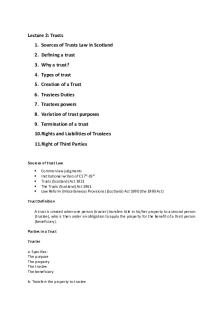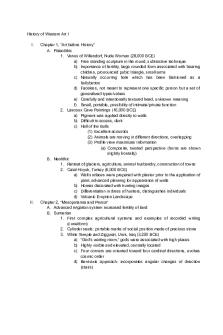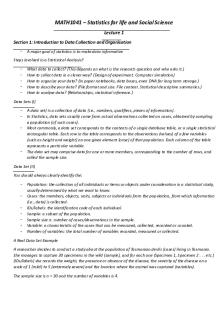Leviticus-Numbers Notes PDF

| Title | Leviticus-Numbers Notes |
|---|---|
| Course | Old Testament Survey |
| Institution | Liberty University |
| Pages | 9 |
| File Size | 207.4 KB |
| File Type | |
| Total Downloads | 109 |
| Total Views | 149 |
Summary
Lecture Notes over Leviticus and Numbers....
Description
Leviticus: How to Approach a Holy God I. Introduction A stationary book – everything takes place at Mt. Sinai LeviticusGod graciously provides a way for people to live in His presence.
Leviticus 26-27 Conclusion – Moses Calls on Israel to be faithful to this covenant. II. Rituals – Part 1 (Leviticus 1-7) A. Two types of sacrifices 1. Giving thanks “thank you” a. Grain offering b. Fellowship offering 2. Repentance “I’m Sorry” a. Burnt offering b. Sin offering
c. Guilt offering B. What did these sacrifices teach Israel? 1. The seriousness of sin 2. The reality of God’s justice 3. The grace offered by God III. Rituals – Part 2 (Leviticus 23-25) A. Two sets of fests 1. Spring feasts a. Passover b. Unleavened Bread c. First Fruits d. Pentecost 2. Fall feasts a. Trumpets b. Atonement c. Tabernacles B. What did these feasts teach Israel? 1. Retold Israel’s story 2. Reminded Israel of who they were and who God is to them “ Be l i e v e r swh os p e n dn ot i mer e v i e wi n ga n dp o nd e r i n gi nt h e i rmi n d swh a tGo dh a s do n e . . . s h ou l dn otb es u r p r i s e di ft h e yr a r e l ys e n s et h a tGo di sn e a r :D. A. Ca r s o n IV. Priests – Part 1 (Leviticus 8-10) A. Ordained - Moses installs Aaron’s line as the first priests. B. Disqualified - Aaron’s sons Nadab & Abihu take the holiness of God to
lightly. V. Priests – Part 2 (Leviticus 21-22) A. Relationships 1. Represent the people in front of God 2. Represent God in front of the people B. Qualifications 1. Highest level of moral integrity 2. Highest level of ritual holiness VI. Purity – Part 1 (Leviticus 11-15) A. Ritual Purity - Five ways to become unclean or impure 1. Contact with reproductive fluids 2. Having a skin disease 3. Touching dead bodies 4. Touching mold 5. Eating unclean animals B. Why would items from this make a person unclean or impure? 1. Associated with mortality and death 2. Cultural symbols to remind Israel that God’s holiness effects every part of life. Life was going to make you unclean, it was not a sin. What was a sin was how you would respond to your uncleanliness. VII. Purity – Part 2 (Leviticus 18-20) A. Moral Purity 1. Three areas of moral purity
a. Care for the poor b. Sexual integrity c. Social injustice 2. Why was moral purity important? Israel is called to live differently than the Canaanites God wanted to reach the world through Israel, so they needed to be differently than the world VIII. Day of Atonement (Leviticus 16-17) A. Two Goats 1. First Goat a. Sacrificed b. Forgiveness of sins c. Propitiation 2. Second Goat a. Set free (scapegoat) b. Removal of sin c. Expiation – removed Si ni sf o r g i v e na n dr e mo v e d IX. Atonement and Christ At the cross •
Sin forgiven & sin removed
•
Propitiation & expiation “This is love: not that we loved God, but that he loved us and sent his Son as an atoning sacrifice for our sins.” 1 John 410
•
“But now, once for all time, he has appeared...to remove sin by his own death as a sacrifice.” Hebrews 926
Numbers From Death to Life I. Setting: When the book of Numbers opens, the Israelites are at Mt. Sinai When the book of Numbers closes, Israel is at the border of the Promise Land The book of Numbers records the journey from Mt. Sinai to the Promise land II. Purpose: Numbers demonstrates that the unbelief and rebellion of “old Israel” will not hinder the creator God from creating a “new Israel” and giving them the land, thus fulfilling His promise to Abraham. III. Movement: Numbers moves from death to life Chapters 1-25 are filled with death (old Israel). In Chapters 26-36 there is no death mentioned (new Israel). IV. At Mt. Sinai (Numbers 1-10) A. Numbered: A census was taken, and 603,550 men of fighting age were counted (Mt. Sinai, Numbers 1-10) B. Ordered: The Israelites were organized around the tabernacle (Mt. Sinai, Numbers 1-10) C. Ruled: If God was going to live in the midst of the Israelites remaining ritually pure was important (Mt. Sinai, Numbers 1-10) V. On the Road (Numbers 10-12) A. Complaining (about the food): Three days into the journey the Israelites complain about their food situation (On the road, Numbers 10-12) B. Complaining (about the leader): Aaron and Miriam challenge God’s authority by claiming equal leadership status (on the road, Numbers 10-12)
VI. In the Wilderness of Paran (Numbers 13-19) A. Checking out the Land: God instructs Moses to send in spies to gather information about Canaan (In the wilderness of Paran, Numbers 13-19) 12 Spies, 10 did not think they could get the promise land. Joshua and Caleb believe God could do it. B. Consequence As punishment for their disobedience to God, the Israelites will wander in the desert for 40 years until everyone 20 years old and older have died. God will give Israel the land and keep His promise to Abraham, but he will punish those who disobey Him. There is a difference between fact-level belief and faith-level belief. Fact-level belief agrees that something is true. Faith-level belief responds to that truth with trust. You can tell the level belief by how a person responds to God’s commands. Fact-level belief that fails to respond to God’s Word is nothing but unbelief in disguise! The disobedient Israelites failed to enter into God’s provided rest. When we respond to God in faith and obedience we come to know the rest he provides. As we trust and obey God we find that He gives us peace, despite the dangers, and relieves our stress despite our fears.
C. Leading a Rebellion Korah convinces a number of Israelites to overthrow the leadership of Moses and Aaron (In the wilderness of Paran, Num. 13-19) Earth splits and swallowed 250 people. 14700 died because they were mad at God for destroying Korah
VII. On the Road (pt. 2)
A. Complaining (about the water) – There was no water for the Israelites and they grumbled against Moses & Aaron. God provided water from a rock (again). However, Moses disobeys God and strikes the rock instead of speaking to it (On the road Num 20-21). The rock of salvation is Christ. B. Complaining (about Moses and the worthless food) – God responds to their complaints by bringing a plague of snakes that kill off some of the complaining people. If they looked to the snake on the pole, they would live. (On the road pt. 2, Numb. 20-21). Jesus points to this when talking to Nicodemus. Those who look to Christ will be saved VIII. At the Plains of Moab (Numbers 22-36) A. Balak, Balaam, and the talking donkey Balak pays Balaam to curse Israel but finds that he can only bless Israel (At the plains of Moab, Num. 22-36) B. Balaam and God’s Promise to Abraham: “Who can count the dust of Jacob…” (Num. 2310/ Gen. 1316; 155) “The Lord their God is with them…” (Num. 2321/Gen. 178) “May those who bless you be blessed and those who curse you be cursed…” (Num. 249/Gen. 123) A leader will come “in the latter days.” (Num. 2414-19/Gen. 315) “A star will come of out Jacob; a scepter will rise out if Israel…” (Num. 2417/Gen. 176,16; 4910) “It shall crush the forehead…” (Num. 2417; Gen 315) C. What is the significance of Balaam’s prophecy? Question - Will God keep his promise to Abraham despite Israel’s tendency for sin? Answer - Just as Balaam cannot curse Israel, so too Israel cannot thwart God’s promises to Abraham. D. Numbered A second census was taken, and 601,730 men of fighting age were counted (At the plains of Moab, Num. 22-36)
IX. God’s Promise to Abraham: Land, Nation, & Blessing A. Land A new Israel is on the brink of the promise land and God has reaffirmed his promise to Israel. B. Nation Israel is a mighty nation - as numerous as the stars in the sky. C. Blessing God has reaffirmed his promise to bless Israel, not because they are so righteous but because of his unconditional promise to Abraham. D. A leader will come “in the latter days.”...
Similar Free PDFs
Popular Institutions
- Tinajero National High School - Annex
- Politeknik Caltex Riau
- Yokohama City University
- SGT University
- University of Al-Qadisiyah
- Divine Word College of Vigan
- Techniek College Rotterdam
- Universidade de Santiago
- Universiti Teknologi MARA Cawangan Johor Kampus Pasir Gudang
- Poltekkes Kemenkes Yogyakarta
- Baguio City National High School
- Colegio san marcos
- preparatoria uno
- Centro de Bachillerato Tecnológico Industrial y de Servicios No. 107
- Dalian Maritime University
- Quang Trung Secondary School
- Colegio Tecnológico en Informática
- Corporación Regional de Educación Superior
- Grupo CEDVA
- Dar Al Uloom University
- Centro de Estudios Preuniversitarios de la Universidad Nacional de Ingeniería
- 上智大学
- Aakash International School, Nuna Majara
- San Felipe Neri Catholic School
- Kang Chiao International School - New Taipei City
- Misamis Occidental National High School
- Institución Educativa Escuela Normal Juan Ladrilleros
- Kolehiyo ng Pantukan
- Batanes State College
- Instituto Continental
- Sekolah Menengah Kejuruan Kesehatan Kaltara (Tarakan)
- Colegio de La Inmaculada Concepcion - Cebu















